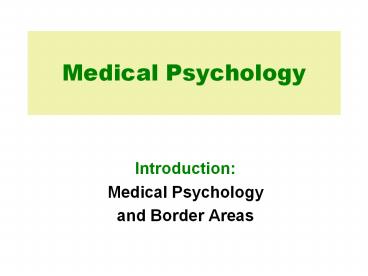Medical Psychology - PowerPoint PPT Presentation
1 / 19
Title: Medical Psychology
1
Medical Psychology
- Introduction
- Medical Psychology
- and Border Areas
2
Themes of Medical Psychology
- ? Psychological factors influencing the
development or progression of disease - Etiology
- ? Patients response to illness and disease
- Outcomes
- ? Communication with patients and colleagues
- - Relational issues
3
Medical Psychologyand border areas
PRIMARY PREVENTION Health education
TREATMENT General practice Hospital
care Rehabilitation
Medical doctors and other health professionals
Individual behavior diet, exercise,
etc. supperted by health professionals
Health Psychology
Clinical Psychology and Psychiatry
Clinical psychologists and psychiatrists
Health psychologists
4
Historical views of diseases
- ? Anatomical pathology
- Belief that disease was localized in anatomy
(16th to 18th Centuries) - ? Cellular pathology
- Belief that cells must be the place to look for
disease (19th century) - ? Germ theory
- Discovery that particles that could not seen
(e.g., bacteria) could cause disease.
5
Contemporary view
- Biopsychosocial model
- (George Engel, 1977)
- Mind, body, and environment
- interact
- in causing disease.
6
The biopsychosocial model of disease
- Biology
- Genetics
- Anatomy
- Physiology
- Pathogens
- Germs
- Toxins
- Social factors
- Family
- Society
- Friends, etc.
7
Psychological components of the biopsychosocial
model
- ? Behaviour (actions in relation to the
environment) - ? Emotions (feelings, subjective states)
- ? Cognition (thoughts, beliefs, and
attitudes) - ? Personality (characteristic ways of
thinking and feeling)
8
Clinical relevance of the biopsychosocial model
- The process of diagnosis must consider the
interaction of biological, psychological, and
social factors. - Treatment recommendations must take these factors
into account. - The relationship between the patient and the
health care practitioner has an impact on the
effectiveness of care.
9
Examples for psychosocial factors influencing
the onset of illness or injury
- ? Many patients diagnosed with cancer having had
some significant loss 12-18 months prior to
diagnosis. - ? Individuals with high stress, low resources and
poor coping have greater risk for injury
(accidents, etc.).
10
Major life events, stress, and illness outcome
- 2000 peoples life events and periods of illness
in the previous 10 years (Rahe et al, 1967). - ? Approximately 50 of those who reported higher
life stress scores indicated varying degrees of
illness the following year. - ? Life stress scores at the very top end were
positively correlated with the number of reported
periods of illness.
11
The practical relevance of medical psychology
- ? An interdisciplinary effort to open
communication and collaboration. - ? A common language can be created in which
different disciplines can benefit each other.
12
The use of psychological interventions
- Short-term behavioral interventions have been
effective in helping patients to - ?Manage pain
- ? Reduce anxiety prior and after surgery
- ? Improve communication with doctors
- ? Manage side effects and treatment effects when
coping with chronic illness
13
Contributions of psychology to medical care
- ? Reliable and valid measures for assessing
health-related factors. - PSYCHOLOGICAL TESTS
- ? Techniques useful in changing behaviours that
affect health and illness. - BEHAVIOR MODIFICATON, SUPPORT
- AND PSYCHOTHERAPY
14
The clinical health psychologist
- ? A psychologist trained to work in collaboration
with other health professionals - ? Intervenes at the individual level
- to treat illness,
- slow or prevent disease progression, and
reduce disability
15
The Practice of Medical Psychology
16
Pain management
17
Modification of illness beliefs
18
Communication with patients
19
Patient education































